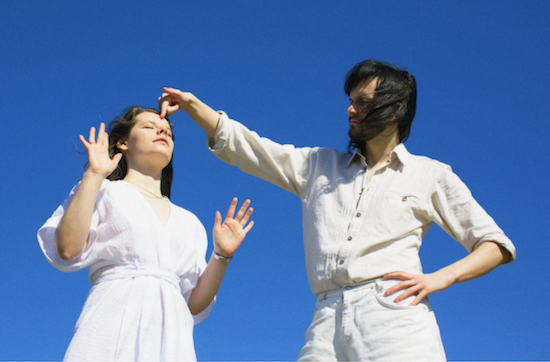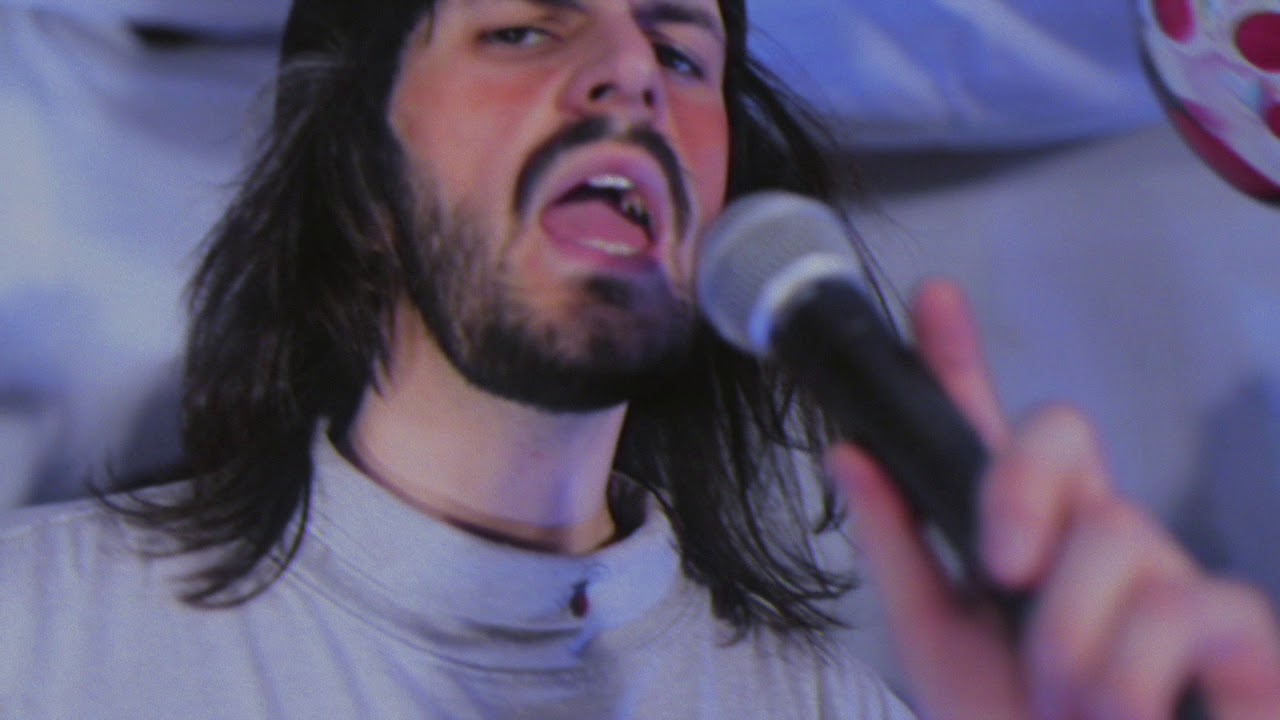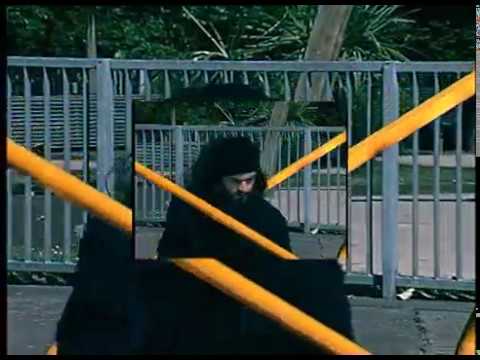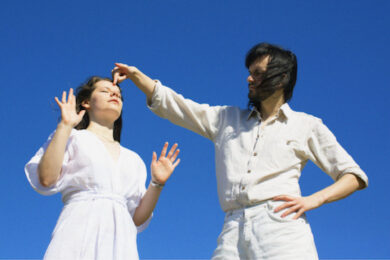Lewis Cook has been putting out music since 2012; his own trippy, solo synth-brews as Mother Ganga as well as bendy-electronic cassettes from other Glasgow artists and compilations on his label Instructional Media. In 2014, Suzi Rodden quit her job as a secondary school French teacher to team up with Lewis, her boyfriend since high school, and concentrate on Happy Meals, a minimalist, cosmic disco project which they created out of a series of pop experiments at Glasgow’s Green Door Studio.
Their debut album Apéro, featuring detached, floaty French language vocals by Suzi, was nominated for the Scottish Album Of The Year Award in 2015. They followed it up with the Fruit Juice EP and a second album, last year’s Full Ashram Devotional Ceremony. It tied in with their Full Ashram Sleep Garden event – an overnight sleep party in a community hall, with live music, communal napping and a morning yoga session. Guests were invited to bring whatever beer or tea bags or snacks they needed to get through the night and a BYOP (Bring Your Own Plant) policy was encouraged – “to absorb the music and to venerate our performance area”.
Beneath the psychedelic, krautrock sounds and the summery, Italo vibes of Happy Meals – now renamed Free Love – runs a deep DIY obsession and a desire to make something bigger. Their vision is a utopian one, influenced by rave culture, Eastern religions, politics and magic – where community grows strength to fight the forces of capitalism and nihilism.
What were the ideas behind the new video?
Lewis Cook: We got some friends in to help film it. We recorded it in Carlton Studios in Glasgow. It features four different ‘bands’ with four different backdrops. I wanted it to look like a Sparks video or something like that. I like videos where it’s just a band playing. But because the track is all electronic music, it’s just us with drum machines and synthesisers. So we thought it’d be cool to do this thing you used to see in the 90s where people had clearly made a track on a sampler.
Suzi Rodden: But they’re kidding on that they’re playing all these instruments in their video. Big bass guitars and full drum kits and maracas and stuff.
LC: We just used lots of white sheets and got lots of our friends, many very talented musicians in real life, miming along, pretending to play instruments in it. Gareth [Roberts, who runs the Glasgow record label Domestic Exile] is in it, so’s Michael Kasparis [who performs as Apostille and runs Night School Records], Cucina Povera, James T McKay from The Cosmic Dead…
SR: It was really good fun. It’s good to make music you can get lost in, and do it without a big label, just having a laugh with your friends if possible, and sometimes making mistakes, not taking yourself too seriously.
The visual side of what you do seems really important – do you still do all your own artwork, as Henri Claudel?
LC: Yeah, that’s still all me. The videos are usually made in pretty lo-tech and cheap ways, because we’re skint. Like simple effects that come from weird, colourful reflections off a telly, or things filmed on phones. We did the video for ‘Le Voyage’ with two different iPad apps, it took fucking ages [laughs]. We tend to work with friends; Rickie and Jamie McNeill from Cru Servers were involved with the video for ‘Altered Images’ and Jimmy Gage, who’s Passion Pusher, helped with the video for ‘Tomorrow Could Be Heaven’.
Making the ‘Synchronicity’ video was a lot easier and more fun that the last one we made, which involved us spinning on a roundabout in a playground in London for hours on the hottest day of the year. We started shooting at 3am, to get the sunrise and the light slowly changing, and finished at 1pm. I got motion sickness within about 3 minutes. It was like purgatory! We were sat on this reflective metal surface, which basically worked like a baking tray. It just got hotter and hotter. I was wearing this big jacket and a hat. I was really happy with the video, it looked great in the end, but it was a nightmare to make.
It’s hard to imagine you signing some massive deal. Doing things in a DIY way seems a really important aspect of what you do.
LC: Absolutely. That’s kind of why we’ve not had stuff out in a while. We’ve been having conversations with various labels, and thinking about what it would mean to get tied down by something, for the long term. When we’re making decisions about what to do next, it’s good when things just take a natural progression. It’s important for us to keep working with friends, folk that share the same values as us, and not feel restricted. For us it’s all about just being able to continue doing it.
SR: Michael from Night School put out our first two releases, and has become one of our dearest, best friends. We’ve played dates in Europe with him, and he’s had us dancing in his own videos. Maybe that spoils you when you have that good a relationship?
Some of the events you’ve organised, your 12-hour overnight Sleep Garden and recently your Third Ear Yoga sessions on a Sunday afternoon, where you’ve have had live music from experimental artists like Dan Magee (Lo Kindre, MR TC) and Laurie Pitt (Golden Teacher, The Modern Institute, Banana Oil), they seem to be building something bigger than just your own duo, Free Love. You call your own live shows ‘Ceremonies’ and the blurbs around your music your ‘Propaganda’. Are you trying to build a Brave New World?
LC: It’s really nice that you draw those ties with community, because that is really important to us. It’s a huge part, huge of what we do. It’s trying to get the balance of our pop stuff with the Full Ashram stuff [their second album, Full Ashram Devotional Ceremony Vol IV-V on the Optimo imprint, So Low, was "a sonic meditation on a hyperstitious future", designed to guide the listener into a meditative state"], then tying it in with the Third Ear Stuff. We’ve got two more Third Ear afternoons planned, and we’re organising a second Sleep Garden too. It all comes down to that human desire to connect, to socialise, to support people, to create stuff, and to build networks.
We’re creating realities that maybe don’t already exist. It’s an ambitious project which extends far beyond the band, but it’s all very much part of the same thing. It’s like creating temporal communities. Where you have a live space, and there’s a sort of unspoken agreement – you get on a dancefloor. Sleep Garden is maybe an extreme example of that where you have to trust who you’re sharing the space with. I think that there can sometimes be something quite magic that comes from that.
Glasgow seems a pretty good size of a city for doing that in, with decent scenes and lots of overlap. Does it seem like that to you, compared to other cities you’ve visited when you’ve been touring?
LC: Yeah definitely. I think Glasgow has that magic ratio of size, where it’s big enough for you not to feel like you’re talking to the same people and hearing the same voices repeating the same mantra all the time. There’s lots of different ideas buzzing about, lots of people from different backgrounds; it’s diverse. There’s lots of scenes I’m not interested in, and I like that. It’s not too big though. Glasgow’s identity is very shapeshifting.
SR: There’s a lot of crossover too. You wouldn’t just get involved in X scene and never be involved in Y.
LC: As far as building communities, it’s not just me, I’ve heard other people talk about how welcoming it is for musicians coming from all over.
You’ve worked with Night School and Green Door, and people from Golden Teacher – who else is part of this ‘community’ that you’re helping to grow?
SR: Kinning Park Complex [an independent community centre] where we held our Sleep Garden and the Third Ear sessions. DJs like David Barbarossa who played at our album launch party…
LC: 12th Isle, Domestic Exile… Basically it’s easy to contact people because they’re friends, I feel quite comfortable asking them to get involved in stuff, I know that we share the same sensibilities. Values, I guess? Their first question isn’t, “Cool, what’s the fee? I’ll get my people to call your people.” It’s more like, “Ok, cool, let’s do it.” Sometimes people are willing to give up their time to make something special, and obviously when money is there, you have to make sure people get paid.
Besides doing stuff in Glasgow, how did you get on at your residency in a bothy on Eigg?
SR: That was amazing. Johnny [Lynch, founder of Lost Map Records] invited us over, we were the second creative residency in their V I S I T ▲ T I O N S recording project, after Monoganon.
LC: We went over with no agenda. Which is what Johnny encouraged. The idea was there would be something at the end of it – that they’ll release and document. Johnny is such a great and warm guy – so encouraging. He put us on the island and gave us this blank canvas.
The house we stayed in was incredible – it’s called the Bothy Project. We had no wifi and no phone signal. It’s literally one room with a table and a chair, and a tiny kitchenette, and you have to go up a ladder to bed. The shower is outside so every morning we’d get up, light a fire, and then in about an hour there would be hot water. One of the most wonderful experiences for me was going outside in the pissing rain – and having a hot shower, totally naked, with no-one around for miles! Oh my god, it was so good. We made a record about aliens. About being abducted. It’s basically a four-track prog rock concept album. It’ll be out soon as a 12” on Lost Map.
SR: I think the idea came from all the darkness out there. There’s no light pollution.
LC: It was this isolated space. We felt like, if we disappeared from here, it would probably be a few days before anyone even noticed.
SR: At home our phone had been buzzing and we were having some difficult chats about some record stuff. It took a while to switch off from all that, then suddenly, it’s just gone.
Do you think Johnny, being a performer himself, and someone who tours a lot, realises that for that creative phase to kick in, you need plenty space and time, and that being ‘on’ and under pressure isn’t exactly conducive to that?
SR: Yeah totally. It’s a bit similar to Amy Liptrot, the writer, who was able to write The Outrun while she was up in Orkney. I actually met her when I was working as a teacher up there for a year. I was teaching in Stromness Secondary School, and she was living there before she went to Greece for a while. She took me under her wing and showed me around. I almost took on her lease actually. She was brilliant, she drove me about and showed me places where she’d gone for naked swims. Actually – don’t put that in!
It’s fine – she writes about all that in the book! She talks a lot about getting these highs, these clean buzzes, in a natural way.
LC: That’s really interesting – we actually looked into some natural, alternative substances we might be able to use for the Sleep Garden event for example, that would have worked really well with the music. In the end we didn’t use anything. But we really liked the idea of how certain environments can change your perspective on things, and music. Or how certain rituals and spaces affect your experience. With the Sleep Garden, we tried to give some basic instructions. At the end we’re going to clap, there’s a reason for that, and everyone can get behind that, rather than feeling uncomfortable and not knowing what to do.
There are references to rituals in your lyrics and your events and artwork that nod to Eastern religion or mysticism, how important is that to what you do?
LC: I studied Hinduism, Buddhism and Islam at university and I’ve always been really interested in this subject, so I think that definitely influences what we do. It’s not necessarily that what we do is religious. I remember hearing someone once say, “I don’t want to give my kid any ideologies.” But I think it’s dangerous to remove all ideologies from what you do. That can open up a kind of void, an ideological vacuum. It’s important to not throw the baby out with the bathwater I guess. That can leave behind that kind of nihilistic, capitalist narrative. I just can’t click with that at all.
It’s about re-appropriating some of these rituals and language – not just from religion, but from capitalism too. You can’t isolate yourself from capitalism. I always found that a problem with the left was that kind of idea of “Everything’s shit, and it’s just getting shitter.” Yeah, of course, everything is shit. But not being able to visualise anything different, or invent a different future? Fuck, that’s pretty dour. It’s liberating to recognise that everything is fucked and yet, become self-sufficient as a creative person. The inventions of capitalism aren’t inherently evil – technology, or the notion of fully automated Communism! You can incorporate elements I think.
Happy Meals was always a name that brought to mind consumerism. We were always taking the piss out of that, but with a kind of sincerity there at the same time too. So we felt that we were entering a new phase, a new cycle, and we needed a new name too. Certain cycles had come to an end – like me leaving The Cosmic Dead for example. Free Love just seemed to us like another term that’s super positive, super tacky, so overused – to the point that the words become really disposable. But also, those words are so simple, so powerful. It’s about reclaiming those things, taking them back and using them in a way that still lets you stand by your principles.
‘Synchronicity’ is out now. Free Love are playing live this Summer





